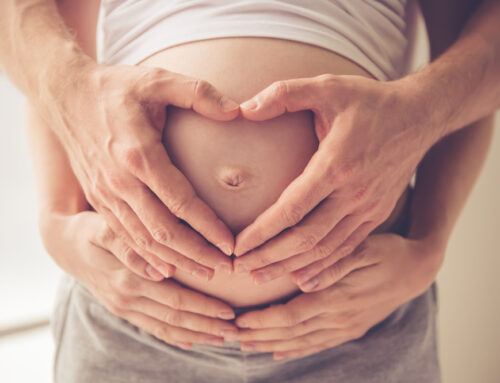You’ve found your mate, you’ve decided it’s the right time to start trying, you’ve stopped your oral contraceptives—you’re ready! Well, not so fast. Rising numbers of couples find that conceiving and carrying pregnancy to term are not as easy as they thought. Maybe you’ve already been trying for several months or even experienced the loss of an early pregnancy.
Things you can do to promote natural conception and a healthy pregnancy
A tremendous amount of research has been conducted, studies published, and books written in the last several years examining the things that can interfere with conception and pregnancy as well as what steps people can take to enhance their chances of a successful pregnancy and the birth of healthy children. Several of these steps should ideally be taken three to six months before you start trying.
I’ve scoured my bookshelves and research journals to pull together some of the most useful recommendations to help you conceive naturally and bring a healthy baby home. In an upcoming article I will cover recommendations for women with specific health issues and women who may need to consider assisted reproductive techniques to achieve pregnancy. So stay tuned!
Your eggs are key
While a woman is born with all the eggs she may ever ovulate during her reproductive years, these eggs are suspended in an immature state in the ovaries until several are recruited and develop during the three to four months before one of them will take over and ovulate. This egg will leave the rest behind, burst out of the follicle and travel through the fallopian tube toward the uterus. Along the way, the egg hopes to meet an eager and healthy sperm to fertilize with so that an embryo will develop that is capable of implanting in the uterus.
During the months before ovulation, the egg goes through a development called meiosis, a process that is prone to going awry and producing eggs with chromosomal abnormalities, most of which are incompatible with life or lead to severe birth defects and shortened life expectancy. This process of egg maturation requires a lot of cellular energy and is susceptible to damage from toxin exposure or deficiency of nutrients. With this in mind, we want to get our ducks in a row and take steps that can improve our chances that these eggs will be intact and embryos resulting from conception are viable.
Important strategies that can pay off
- Moderate weight loss if you are on the larger side, esp. if there’s concern you may have issues with glucose metabolism, such as encountered in PCOS, metabolic syndrome or diabetes. (Conversely, being underweight can also affect regular ovulation and should be addressed.)
- Cleaning up your diet by eliminating processed foods as much as you possibly can. Instead, focus on home-cooked food from fresh, organic whole food ingredients. Emphasize vegetables and a small amount of naturally raised animal products over foods that contain a lot of simple carbohydrates. (I will outline strategies for a fertility-promoting nutrition strategy in an upcoming article.)
- Clean up your home, car and workplace. Make yourself knowledgeable about any chemicals that have been shown to interfere with egg maturation, fertilization, implantation and pregnancy. In particular, avoid using products containing phthalates and BPA (or similar compounds) known to have detrimental effects on your fertility. This includes certain plastic containers, skin care products and cosmetics as well as many other things routinely used around the house. Look for natural and fragrance-free products from manufacturers who fully disclose what’s in their products. The website of the Environmental Working Group is a great resource to learn more.
- Stop smoking, strictly limit your consumption of alcohol, and reduce caffeine intake as much as you can.
Start taking a high-quality daily prenatal multi-vitamin as soon as you start thinking about the possibility of conceiving. Ideally, you should begin your regimen 3-6 months before conception. Ask your Chinese medicine practitioner or naturopathic physician for product advice.
Excellent nutrition, appropriate exercise and stress management strategies, such as regular acupuncture treatments, yoga and meditation, are the foundation of successful conception and pregnancy. But there are a few more things you should consider, especially if you are already in your mid-thirties or beyond.
Creating your personal strategy
Some people have one or multiple MTHFR gene mutations, which can make it difficult for your body to convert folic acid, the artificial form of folate found in most prenatal supplements, to methylfolate. This can have detrimental effects on your eggs and the viability of the embryo. Blood tests are available, but you can also just take multi-vitamins that already contain methylfolate (if you tolerate them well).
Low vitamin D levels have also been found to be associated with longer time to conception and difficulty with implantation. Recent studies have shown that maintaining adequate levels of vitamin D before conception decreases the risk of miscarriage, so have your levels checked and supplement accordingly. Get advice from a holistic practitioner who is current on the research and recommendations regarding vitamin D supplementation. Many primary care physicians are not.
Depending on the amount of B vitamins in your multi, you may also want to add a quality B complex supplement to increase your intake of folate, B6 and B12.
Foods rich in antioxidants, such as berries and green, leafy vegetables, as well as vitamin C and E supplements can help reduce oxidative stress that affects the maturing eggs in your ovaries.
Another useful supplement to provide energy to the mitochondria in your developing eggs is co-enzyme Q10 (CoQ10), which seems to benefit women across the board who are trying to conceive. Your eggs need a lot of energy to correctly replicate DNA in their nucleus.
Several other supplements and nutrition strategies have been shown to benefit women with specific health issues who are encountering fertility challenges or want to improve their odds before they even try. These health conditions include hypothyroidism (including Hashimoto’s), Celiac and other autoimmune conditions, MTHFR polymorphism, metabolic syndrome and diabetes, PCOS, endometriosis, diminished ovarian reserve, and several others affecting the ability to conceive and carry pregnancy to term.
Building your team
Many women do not realize that they are affected by any of these health issues until they encounter difficulties falling pregnant. Most gynecologists do not specialize in fertility medicine or keep up with functional issues that can be addressed non-medically. So, working with a knowledgeable integrative practitioner can help you unearth and address many of these challenges, whether you have been trying for a while, have miscarried or are just starting out. Often, it takes a team of providers from different specialties, including reproductive endocrinology, Chinese medicine and naturopathy, to devise a personalized approach that gives you the best chance at success. To learn more, download our complimentary guide to natural conception.
As a clinical herbalist I can also support you with prescriptions of botanicals that can be very useful to regulate your menstrual cycle, promote ovulation and conception, and even prevent miscarriage. This approach can help you conceive naturally as well as increase your chances of a positive IVF outcome.
© 2023 Christiane Siebert








Leave A Comment